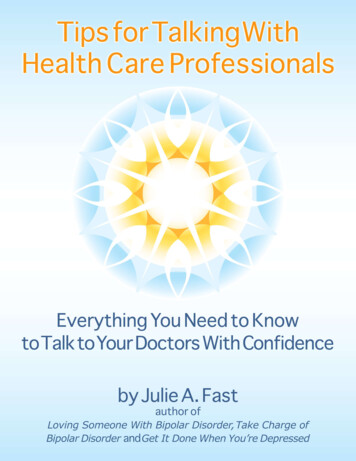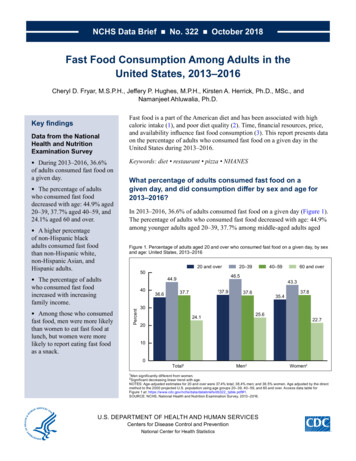
Transcription
Tips for Talking with Health Care ProfessionalsPage 2 of 41A note from Julie FastAs with all of my work, I want to remind you that I’m not a health careprofessional. I do write books with health care professionals such as my bookLoving Someone with Bipolar Disorder: Understanding and Helping Someonewith Bipolar Disorder written with Dr. John Preston. I’m a writer who hasbipolar disorder. I check my facts carefully and am always mindful of what Iwrite, but as is the case with all books, the information in Tips for Talkingwith Health Care Professionals is not a substitute for professional medicalcare. Thank you and remember: bipolar disorder is an illness, not your life.IntroductionI want to tell my doctor to remember that I am a person and not just apatient.It’s as though the minute someone says doctor before their name we turnover all of our will and ability to take care of ourselves.When are the doctors going to realize medical school isn’t the onlyreliable place to become medically educated? When are they going to realize thatthey work for us, and to talk down to the boss and insult him or her whilepridefully asserting personal beliefs is wrong? When will doctors seek the truthinstead of the Pharmaceutical Industry’s party line? How is it that the US spendsmore in healthcare per year than any other country in the world, and we areconsistently the sickest people in the world? Pharmaceuticals treat symptoms. Ifthat is all they are doing, guess what? We will have a lot of other symptoms weneed help with.Sometimes I just feel too tired to deal with this illness. This is when Ireally need help from the people I have chosen to be on my health care team. Imay get a massage or maybe call my therapist. I need that safety net. This is sohard to deal with sometimes and I can’t do it alone. The people I see to help mewith this illness are invaluable. I couldn’t manage bipolar disorder without them.I believe in being informed, assertive and an advocate for myself and myfamily. I believe most doctors are doctors because they truly want to help people.I also believe it is easy to allow the drug companies to run your practice. Toomany patients have to be seen in a day to get more than the national average oftwenty minutes with your physician. No wonder malpractice is so high. Howcould you possibly have a real understanding of what is going on with yourpatient and come up with a plan both of you can live with in twenty minutes?Someone please tell the HMOs we aren’t cattle. 2005 Julie A. Fast All Rights Reserved
Tips for Talking with Health Care ProfessionalsPage 3 of 41I would not be here if it were not for my therapist and doctor. Period.People with bipolar disorder spend a lot of time talking with health careprofessionals. If the person is really ill, their family members often have to do thetalking for them. But what if the health care professionals you’re talking to don’tlisten very well? Or what if you’re not really good at expressing yourself? Thiscauses problems on both sides and can become one of the most frustrating parts ofhaving or loving someone who has bipolar disorder.The good news is that there are skills you can learn to effectively communicatewith the health care professionals in your life. There is such a relief in knowingthere are people you can turn to when you’re ill and being able to effectivelycommunicate with them makes the process even easier.About this BookTips for Talking with Health Care Professionals will explore the commoncommunication problems that people with bipolar disorder and the people wholove them often come up against when trying to get help for this illness. It willthen offer ideas on how to bypass these problems to create loving, mutuallybeneficial and productive relationships with health care professionals.Author note:The purpose of this book is to create better relationships with health careprofessionals. The purpose is not to put down or degrade the very important workthat health care professionals do. If you’re like me, the role they play in our livesis paramount and we want them to continue helping us. We just want to be able tocommunicate with them a bit better.Another goal of this book is to help you find balanced health care. There are manyoptions out there when you create a health care team. This book will explore someof your options and how you can talk with each health care professional aboutyour needs.The quotes throughout the book are from the letters I regularly receive fromreaders at www.bipolarhappens.com. There are also excerpts from my upcomingbook, Take Charge of Bipolar Disorder that will be published in 2006. Pleasenote that the term health care professional will be abbreviated as HCP in thefollowing text. 2005 Julie A. Fast All Rights Reserved
Tips for Talking with Health Care ProfessionalsPage 4 of 41What are Your Main Concerns?The main communication issues I notice from the letters I receive and the people Imeet on my book signings regarding talking with health care professionalsinclude the following: Doctors don’t have enough time to give me the help I need.Doctors don’t listen.Health care professionals don’t really understand bipolar disorder: It takesa lot of time to explain the illness to someone who is not familiar withthe symptoms and then the appointment time is done.Therapists want to discuss life issues when it’s actually bipolar disordercausing the problems.Doctors are impatient, arrogant or overly stressed.I feel scared and too intimidated to talk with them and tell them what Ineed.Doctors are more educated so they always think they know best: I havethis illness and I know what works for me. I need a partner in healing,not a boss: Who am I to tell them what I think? I don’t have a degree.I don't have the communication skills to really let them know how much Ineed from them.There just isn’t enough time for all I need.What are the Concerns of Friends and Family Members? Worried the health care is not good enough for their loved one.Too much to do at home to help person.Need more outside help.Need language to talk with doctors.Feel that health care professionals don’t listen to them because they’re notthe person with the illness.Not sure how to deal with the fear and worry.It’s obvious that this is a large and complex issue. Though it may feeloverwhelming to think that you as a person with bipolar disorder or as a friend orfamily member of someone with bipolar disorder will have to deal with healthcare professionals for the rest of your life because of this illness, there are ways tosignificantly increase your communication skills and find the help you need fromthe people you choose to have on your health care team. This book offerssuggestions on how to create a productive and friendly relationship with a healthcare provider right from the beginning. This is especially important if you orsomeone you love has just been diagnosed. You are in the position of reallythinking about who you want to have in your life to help you with this illness. Ifyou’re already in a relationship with a health care professional, the following tips 2005 Julie A. Fast All Rights Reserved
Tips for Talking with Health Care ProfessionalsPage 5 of 41will help you increase your communication skills so that you can ask for and getthe help you need.Tips for People with Bipolar DisorderOur time is valuable too. If we’re late we miss our appointment, but ifthey’re late we have to sit there. It’s not right.I do have monthly appointments with my doctor, but I don't feel that theyare helping. These visits consist of the doctor asking me about my meds andwriting prescriptions while I talk. Sometimes I feel as if he doesn’t even hear whatI’m saying. I’ve taken so many different medications that I can’t even rememberthem all, and I am now on 20 mgs of Lexapro, 450 mgs of Wellbutrin, 1500 mgs ofDepakote and 25-50 mgs of Seroquel everyday. I am beginning to feel like I’m awalking pharmacy. I would desperately like help on learning how to recognizeand control my symptoms, but I just don’t know how to deal with all of thesemedication changes and side effects.Tip #1: Learn to Effectively Talk with Your HCP about Drugs andSide EffectsThis may be one of the most difficult topics to discuss with a HCP. Our currenttreatment plan for bipolar disorder almost exclusively emphasizes drug therapy,even when it’s obvious that drugs don’t always work in the way that they should.Statistics show that 20% of people diagnosed with bipolar disorder after their firstepisode respond optimally to medications. In other words, there are millions ofpeople with the illness who have to search for quite a while to find the correctcombination of medications and even then, people struggle with side effects.There is also a group, myself included, that simply can’t tolerate medications atall unless a new medication comes out with less severe side effects. Though thereis no doubt that drugs save lives and are a very important part of bipolar disordertreatment, it’s equally important that we advocate for our physical health andmental well being while taking these drugs. I’ve received thousands of lettersfrom people with bipolar disorder who complain that their doctors simply will notlisten when they ask for help with medications. There are many reasons for this,the main one being that many doctors don’t know of any other options excepttrying new medications.Talking with your HCP about your medications is a skill you will really need asyou go on the bipolar disorder treatment journey. Being able to clearly stick upfor yourself and still accept that you will probably need medications for thisillness is a fine balance. I know that when I gained 80 pounds from medications aline had been crossed. I remember sitting in my doctor’s office begging her tohelp me with the weight gain. All she would say is, “We need to get you stable 2005 Julie A. Fast All Rights Reserved
Tips for Talking with Health Care ProfessionalsPage 6 of 41first.” Later of course, I found out that much of my rapid cycling was due tomedications and never taking anti depressants would have been the correcttreatment plan for my type of bipolar disorder. You probably have similar storiesand frustrations. Here are some tips for talking with your doctor about sideeffects:How Long Should I Wait for Results?There is always a time period for drugs to work. This can be from days to weeksor even months, so it’s important that you know when a drug should startworking. You can research this information and then talk with your doctor aboutyour concerns.As the weeks go by on a new medication, you may experience some symptomimprovement, but if it’s not dramatic or if you’re having trouble with noticeableside effects, it’s natural that you will want to talk with your doctor aboutmedications. Many times you will be told to just stay with the medication so thatit can have enough time to work. There’s often a good reason for this since manypeople do benefit if they stay on medications long enough for the clinical effect tokick in. One of the most common problems is a combination of unpleasant sideeffects and a lack of response. It’s understandable that this can lead todiscouragement. The facts are that given these circumstances, a lot of people willjust stop taking the medication against medical advice and often will get sicker,ultimately having to start all over again with medications.This is why it’s so important to be open and frank with your doctor if you’re atthat place where you’re unwilling to stick with your medications. It might be goodto say something like this:"I understand that your recommendation is to just keep taking the medication.I believe that it’s important for me to be able to be open and honest with youabout my treatment. I need you to know that I’m at a point where I'm probablyjust going to stop the medication on my own, and I'd like to kindly ask you toplease consider other options. Would you be willing to let me know othermedication choices that you think might be an alternative to what I’mcurrently taking?"Talking with your doctor about side effects can be difficult especially if theyrespond to you in the following way: Just give it time – the side effects will calm down.We just need to see how this drug will work before we make any changes.The weight gain is just a part of the drugs, once you are more stable wecan deal with the weight gain.We have to wait and see what happens before we try something new. 2005 Julie A. Fast All Rights Reserved
Tips for Talking with Health Care ProfessionalsPage 7 of 41This is one reason taking charge of your own treatment is so important. You haveto decide what you can and can’t tolerate in terms of side effects. There’s a fineline between what’s considered normal for side effects and what’s unacceptable.If you’re sleeping 14 hours a day and have gained 40 pounds, then it’s time foryou to talk with your doctor. If you can’t live your life because of a certainspecific side effect such as a respiratory problem or a serious rash, it’s time to talkwith your doctor. This may be difficult as it’s often hard to get an appointmentand may be quite intimidating to stick up for yourself, but it has to be doneespecially if you’re thinking of missing doses or stopping your mediationsbecause of these problems. If side effects are significant and clearly not tolerable,it’s time to talk with your doctor.Talking with Your Doctor about MedicationsThe following suggestions can help you talk with your doctor about medications: Can you please tell me why I’m on this particular medication?I know that it’s important that I stay on medications and I’m willing to dothat, but these side effects are simply to strong for me right now. I can’tfunction normally if I am sleeping all day or constantly running to thebathroom because of stomach problems. What are my options?How long do you think I need to wait to see results from this medicationand what if I can’t wait that long?What ideas do you have for reducing side effects? What do you knowabout microdosing?Are there any new medications coming out that will work with less sideeffects?I could really use help with this. Do you have any suggestions on where Ican find more help?Tip #2: Tell Your HCP What Mood You’re in – Educate Them onYour Particular SymptomsSo many of us assume that our health care professionals understand bipolardisorder. In reality, it’s safer to assume they don’t know what you go through andthey certainly don’t know what mood you’re in when you see them. It really isokay for you to tell them how you are as soon as you start your appointment. Thisgoes for all health care professionals from your dentist and masseuse to yourgeneral doctor or psychiatrist. If someone knows you’re down, anxious or thatyou’re slightly manic, they can adjust their services to help you more effectively.For example, if you have a lot of dental problems due to medications (as I do) itmay be that going to the dentist is a stressful and expensive process. When I go to 2005 Julie A. Fast All Rights Reserved
Tips for Talking with Health Care ProfessionalsPage 8 of 41the dentist with yet another cracked tooth, I always explain why I’m crying andwhy the procedure is so upsetting. I don’t go on and on about it, but I fell it’s veryimportant that he knows that I’m not crying because I’m scared of the procedureor that I just dislike dentists in general. I say, “I’m quite upset about having moredental problems. I was on medications for many years and they really wrecked myteeth. Having to come in again brings back a lot of memories and causes me tohave a down swing.” My dentist has been very compassionate about this. Andwhenever I come in, he remembers what going to the dentist means to me. Hereare some tips for letting your HCP know what mood you’re in:--Keep your explanation simple. I’m in a down swing today which means Imay cry a bit. It has nothing to do with you and I could use your help toremind myself that it’s an illness. Or, I’m really feeling up. I know I’ll talktoo much. Can you help me with this? Or, I’m psychotic today. It will behard for me to look you in the eye, but I am listening to you.Remember that it may take a few times for your HCP to know that theyneed to know what mood you’re in before they can help you, but they canlearn.Never be embarrassed to let someone know you’re in a mood swing.These are health care professionals, not coworkers or other people youmay be scared to talk to about bipolar disorder. This should be a safe placefor you to communicate.Tip #3: Take Someone with You to an Appointment – Find anAdvocateIf you really feel too sick to help yourself, it’s fine to take someone with you toyour appointments. This can be a friend, family member or anyone else you thinkmight be helpful. They can sit with you in the waiting room and advocate for youin the appointment. Of course, you will need to clear this with your HCP, but ifyou feel having someone with you to take notes or just be with you as a friendduring a stressful time, don’t hesitate to do it.Tip #4: Write a Complaint LetterWhen Ivan (my wonderful ex partner who has bipolar one) moved to Englandearlier this year he had to find a new medications doctor to help with his Tegretoland Prozac. He was assigned a nurse and waited quite a while for theappointment. His move from France to England had been very stressful and thedepression was pretty strong. He was hoping to get some compassion as well ashelp with the stomach problems caused by the medications. His appointment didnot go well. He called me afterwards and said the person he saw was notunderstanding. She basically got on his case for being sick. Well, Ivan lived with 2005 Julie A. Fast All Rights Reserved
Tips for Talking with Health Care ProfessionalsPage 9 of 41me for many years and has read all of my books. He knew what to do. He quicklywrote a professional, non histrionic, but very strong complaint letter. He calledthe clinic and asked where he should send the letter and then actually sent it. (Somany of us think of the letters, write them and then don’t actually send them!)Here is his letter and their reply:Dear Madam,I had my fist visit at your centre on Tuesday 5/10 at noon with Maureen Salder.The beginning of the visit went fine. At the end Ms. Salder lost her temper andtold me I was not cooperating. She told me I was not giving her enoughbackground information.I think it was most inappropriate, especially after telling her that I was sufferingfrom bipolar disorder and that I was currently under treatment. It is notprofessional to tell off a patient and especially one suffering with a mental healthdisorder.I would like to get an apology from Ms. Salder as I don't think her behavior wasappropriate. She may need some training in how to work with someone who hasbipolar disorder. Could you, please, make sure that this doesn't happen again? Isuggest she looks at www.bipolarhappens.com. I designed this web page alongwith my former partner who writes books on bipolar disorder.Yours sincerely,Ivan KanisHere is the reply:Dear Mr. Kanis,I am very sorry that you were very unhappy with your consultation with MsSalder on 4th October 2004. I have now had the opportunity to discuss this withMs Salder and also with Dr. Whaler the Clinical Support Doctor.Through our discussions Ms Salder detailed the consultation that you had withyou and we all agreed that communication was the issue in this particular case.Ms Salder does apologize that the consultation was not an easy one, as a result ofthis Ms Salder has used this opportunity to review her consultation skills and alsothe problems associated with mental health.I would like to thank you for your feedback, it is important that we do hear theviews of our patients. If you would like to discuss this further I would be happy tomeet with you. 2005 Julie A. Fast All Rights Reserved
Tips for Talking with Health Care ProfessionalsPage 10 of 41Yours sincerely,Grace EvanstonPractice ManagerTip #5: What to Do When a Doctor Says Something UnkindI had a psychiatrist tell me one time (while hospitalized) that I wascausing more problems than anyone else on the unit and wasn't as sick as theywere.I once saw a naturopath who looked at my chart, looked at me and thensaid in a very disdainful voice, “Wow. You sure do come in here a lot.”There is nothing worse than hearing something unkind from the person who issupposed to help you get well. Bipolar disorder makes us do a lot of things wedon’t like. We can be hypochondriacs. We get needy. We go to the doctors a lotwhen we’re sick. You would think that HCP’s would know this and treat usappropriately. Saying something mean to someone with a mental illness onlymakes the illness worse. The difference between constructive help and meannessis a fine line. If your doctor says something unkind, it’s up to you to calmly andprofessionally tell them that what they said hurt you and how they can bettercommunicate with you in the future. You can do this through a complaint letter asIvan did or you can tell them in the moment. It’s hard to stick up for yourself, butthe more you can teach your HCP to treat you with compassion, the more quicklyyou can learn the skills you need in order to get stable. Here’s an example:Naturopath: Julie, you sure do come in here a lot.Julie: (I literally feel my mood go to the bottom of my shoes and onto thefloor. I feel like dying.) I come in here a lot because I have bipolar disorderand the medications don’t work for me. By coming here I take care of myselfin the only way I know how. I’m trying all I can to get better. Do you haveany experience with medicine resistant bipolar disorder? Do you have anyidea what my life is like when I’m sick? Maybe we can talk about this somemore.There is no guarantee that talking with your HCP in this way will help themunderstand you more, but it will certainly help your mood because you were ableto stick up for yourself without causing a scene.Here are some more scripts for what to say if someone says something unkind: 2005 Julie A. Fast All Rights Reserved
Tips for Talking with Health Care ProfessionalsPage 11 of 41I understand that my behavior frustrates you. It frustrates me as well. Thetruth is that most people with bipolar disorder have this kind of behavior.None of us like it but sometimes it’s hard to help it. It embarrasses me. I’mhere to get your help with this. When you get frustrated with me, it only makesit worse.I need your help. I need you to see what is the real me and what is bipolardisorder. If you’re clear on what bipolar looks like it may be that you canrecognize it in me. It’s not something personal. I’m not trying to be difficult.The illness makes me difficult. I need your help with this.As you can see, the more you can appeal to their compassion, the more chanceyou have of their finally understanding that you KNOW that your behaviorappears to be something you can always control, but it’s actually a result of anillness and not something under your control.Tip #6: Be Reasonable: Know When Bipolar is Talking and WhenYou’re TalkingIt also helps if you can remember that your doctor is a human being just like youwith the stresses and problems of any person who is trying to help people with aserious illness in a very short amount of allotted time. Because of this, it’s veryimportant that you make health care decisions when you’re relatively stable. Ifyou react and fire your doctor because of a bipolar disorder mood swing this is anexample of an impulsive decisions you could later regret.You’re normal if bipolar disorder makes you say and do many things you laterregret. HCP’s are not immune from your behavior. When you start with someonenew, it’s important to remind them and yourself that there will be times that youwill not be reasonable. If they see this unreasonable behavior in you during anoffice visit, on the phone or maybe in an email, they need to have a safe way to letyou know. The Health Cards System for Bipolar Disorder can really help withthis. If there are things you say and do regarding HCP’s when you’re sick, youneed to write them down and share them with your HCP during your office visits.For example, if you get very negative and picky when you’re depressed, you needto remind yourself that nothing your HCP does when you’re in this mood will feelgood enough. You may think they’re incompetent or uncaring. And it may all beyour mood and have nothing to do with them. The more you can talk about thisbefore it happens, the more tools you will have at your disposal when you have atough visit. Here’s an example of what you could say if you’re having a tough daywhen you sit down for your visit. 2005 Julie A. Fast All Rights Reserved
Tips for Talking with Health Care ProfessionalsPage 12 of 41As you will soon notice, I’m in a rotten mood today. Nothing feels right.Everything is upsetting me today. I don’t think I’m being very reasonable. Idon’t want to take this out on you and ruin our visit. I need your help with thistoday.Talking like this can be uncomfortable at first. It’s so much more personal thanmany of us want to be with a HCP, but when it comes to bipolar mood swings,it’s always important to ask yourself, AM I REASONABLE? before every visit.Tip #7: What to Say When Doctors Ignore Your Concerns aboutWeight GainI get depressed about my weight. Doctors really don't understand that themeds that make you fat are stopping you from getting depressed but you still getdepressed because you are fat! They aren't wonder drugs they’re aids. We needhelp with our health as well.After three years of medications I weighed 260 pounds. I’m 5’6.” I’ve never beenmore embarrassed or depressed in my life. The weight gain doubled mydepression. And my doctor simply didn’t understand this. Her entire focus wasgetting me stable, and yet in hindsight it’s so obvious that the medications weremaking me more ill than the illness alone. Why was she so blind to my constantconcerns about weight gain? I think it’s because she honestly didn’t know what todo. She was trained to deal with medications, not their side effects. Weight gainwas just something that happened.Weight gain is inevitable with some drugs. There are new drugs out now that saythey have less weight gain and this is helpful. But weight gain is still a real issuewith many people on drugs for bipolar disorder. It is up to you to monitor yourweight very carefully the minute you try a new drug. This is the only way toprevent excessive weight gain from certain medications. If you’re on a medicationthat is causing continual weight gain, it may be time for you to talk with yourdoctor and try a new medication. Yes, it’s a trade off between stability andphysical health, but how you look and feel is a very important part of your mentalhealth. Don’t sit back and let the out of control appetite continue. If you’ve gainedmore than ten pounds, it’s not okay. You need a plan to lose it, keep it off andthen prevent it from coming back. Easier said than done, I know. But it has to betaken care of.Tip #8: Write it out First – You Won’t be SorryDoing things in the heat of the moment can lead to problems. I’ve found thatwriting something down first helps. I then leave it for a few hours and come back 2005 Julie A. Fast All Rights Reserved
Tips for Talking with Health Care ProfessionalsPage 13 of 41to it. This is especially important with email. When you’re communicating with aHCP, especially if you feel quite heated about the situation, it really helps if youcan write out what you want to say, let it sit, revisit it later and then decide whatto do. This also helps if you have to talk to someone at a set time. For example, ifyou want to talk with your HCP about something that is bothering you and youonly have a 20 minute appointment, you can have your issue written out andready to go before you get there. Complaint letters are the same. Write them andlet them sit, then decide if they are reasonable. This saves a lot of future stress.When Ivan wrote his complaint letter to his clinic, he sent it to me first for an edit.This assured that it wasn’t sent in the heat of the moment.Tip #9: Find Someone NewYou can fire your HCP you know! You’re the one they are helping. You’re theboss. You have the power in many cases. What probably holds you back is fear.Another problem is that HCP’s, especially medical doctors are so deified in thisworld that we simply get tongue tied when we want to stick up for ourselves.When you want to change doctors, you will have to make sure you are beingreasonable, that you’re not asking for something impossible and that you’re notburning bridges if you have limited options. But if all of that is taken care of, thendo it. Take care of yourself and get yourself the kind of health care you need. Iknow that when I changed psychiatrists from one who was overworked and veryburned out to one who was compassionate and really human towards me, myhealth really benefited.Tip #10: Learn to Talk to Your TherapistI love my therapist. She’s willing to learn about this illness and never judges mefor being sick. Her office is the one place I can really, really cry about being soill. I can tell her what a burden it is to have a mental illness and how scared I amabout my future. She listens and then we create a plan for dealing with thesefeelings.I have a truly gifted and wonderful therapist named Robin. I know that workingwith me has been a challenge for her. I’ve had a lot of downswings in the pastyear right in front of her. It's hard for her to know what’s me and what’s bipolardisorder. She uses the Health Cards with me, so she knows a lot of mysymptoms. It can be really tough to figure me out when I'm sick though. I soundso totally convincing when I talk. Especially when I’m hypomanic. I evenconvince myself about things and then when the
Loving Someone with Bipolar Disorder: Understanding and Helping Someone with Bipolar Disorder written with Dr. John Preston. I’m a writer who has bipolar disorder. I check my facts car











